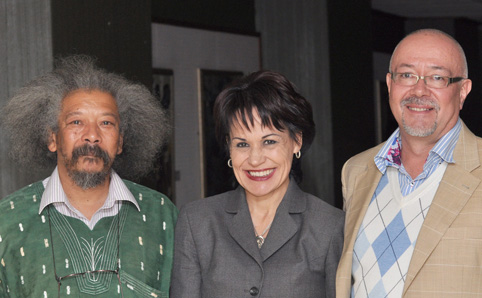Latest News Archive
Please select Category, Year, and then Month to display items
12 October 2020
|
Story Dr Cindé Greyling
|
Photo Supplied
 Exercise and nutrition can work wonders for your mental health – you don’t even have to ‘feel like’ or ‘enjoy’ moving around and eating well for it to work – it does its thing anyway.
Exercise and nutrition can work wonders for your mental health – you don’t even have to ‘feel like’ or ‘enjoy’ moving around and eating well for it to work – it does its thing anyway.
Nowadays, people talk about mental health like it is the common cold – which is good! But do you know what it really means? Being mentally healthy does not only refer to the absence of a mental illness but includes your emotional and social well-being. One would almost want to add physical well-being too, since a healthy body does indeed support a healthy mind. However, since so many people consider themselves ‘mental health experts’, some myths have been sold as truths.
Myth #1 – You are doomed.
Nope. Never. You are never doomed. There is always help. Mental-health therapies range from self-help, talk therapy, medication, to hospitalisation in some cases. Somewhere on this spectrum of treatments, there will be something that works for you. But you must be willing to get the help and do the work. For starters, exercise and nutrition can work wonders – you do not even have to ‘feel like’ or ‘enjoy’ moving around and eating well for it to work – it does its thing anyway.
Myth #2 – It won’t affect you.
It may. Research suggests that one in five people may suffer from a mental illness at some point in their lives. Being well now does not mean that it will stay that way. Biological and environmental factors both impact your mental health. Hopefully not, but at some point, you may experience an event that affects your mental health.
To remain integrated in a community is always beneficial
for anyone suffering from a mental or physical condition.
Myth #3 – Someone struggling with mental health must be left alone.
Hardly! To remain integrated in a community is always beneficial for anyone suffering from a mental or physical condition. You do not need to fix them, but to remain a friend. Continue to invite them, even if they decline. Do not judge, and do not try to understand. Just stay around.
Go and be kind to yourself, and to those around you.
UFS outlines research achievements
2011-09-02
|

|
|
At the launch of the 2010 Annual Research Report, were from the left: Mr Robert Kriger, the director for Policy and Strategy at the National Research Foundation (NRF); Prof. Driekie Hay, Vice-Rector: Academic and Prof. Frans Swanepoel, Senior Director: Research Development.
Photo: Stephen Collett
|
The University of the Free State (UFS) is well on course for delivery on its most important academic duty as a research university. This was the message that came forward at the launch of the 2010 Annual Research Report of the UFS on 30 August 2011.
Speakers at the launch, which included Prof. Jonathan Jansen, Vice-Chancellor and Rector, as well as Prof. Driekie Hay, Vice-Rector: Academics outlined the key strategies and achievements of the UFS for the 2010 academic year. This included the establishment of a Postgraduate School at the UFS, the first of its kind at a public university in South Africa. Prof. Hay told guests that the aim of the Postgraduate School was to broaden research and deepens scholarship on postgraduate education in the country. She highlighted some initiatives the UFS undertook in 2010 to build and maintain its intellectual capital. Some of these initiatives included the appointment of seven senior professors and recruiting more female and black scholars and academics.
Also speaking at the event was Mr Robert Kriger, the director for Policy and Strategy at the National Research Foundation (NRF). Kriger reflected on the brilliant minds of scholars such as Archie Mafeje, Lewis Nkosi and Dennis Brutus and argued for efforts to increase the country’s research output.
Some highlights of the 2010 Annual Research Report:
- The total funding available for research at the UFS increased from approximately R199 million in 2009 to just over R210 million in 2010. A total of R31.8 million was made available from central university funds.
- In 2010 the UFS was home to 92 NRF-rated researchers. During 2010, four researchers applied for re-evaluation and of these, two improved their rating, while a further five received a first-time rating.
- The Faculty of Natural and Agricultural Sciences continue to be the most prolific producer of publications in accredited journals, while the Faculty of Education has shown a 54% increase in its publication output.
- Staff members in the Physics department at the UFS Qwaqwa Campus published 22 papers in international peer-reviewed journals during 2010.
- Also at the Qwaqwa Campus: Ms Khethiwe Mtshali,a postgraduate student in the parasitology research unit of the Department of Zoology and Entomology, received a best Honours presenter award at the 1st Annual Research symposium of the National Zoological Gardens of South Africa.